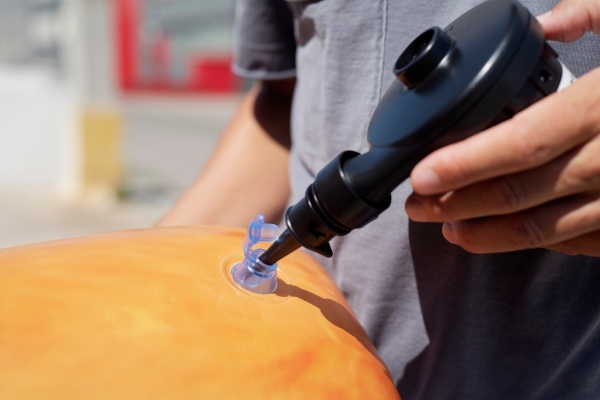A Deep Dive into Air Mattress Materials
Ah, the humble air mattress. It’s the unsung hero of guest rooms, campsites, and impromptu sleepovers. But beyond its undeniable ability to conjure up extra sleeping space, lies a hidden world of materials, each vying for the title of “best.” Fear not, intrepid slumberers!
This comprehensive guide unzips the mysteries of air mattress materials, empowering you to navigate the inflatable jungle with confidence.
The Contenders:
-
PVC (Polyvinyl Chloride): The OG of air mattress materials, PVC reigns supreme in affordability and durability. Lightweight and water-resistant, it’s perfect for occasional use or budget-conscious adventurers. However, PVC can get uncomfortable in hot weather and lacks the eco-friendly charm of greener alternatives.
-
TPU (Thermoplastic Polyurethane): Think of TPU as PVC’s sophisticated cousin. It’s just as strong, but more flexible and cold-resistant, making it a haven for restless sleepers and winter campers. Bonus points for being phthalate-free and less prone to that “plastic smell.”
-
Flocked Materials: This isn’t a material itself, but rather a velvety coating applied to air mattresses for added comfort and grip. Imagine the soft touch of a suede jacket, only air-filled and ready to cradle your weary bones. However, flocked surfaces can trap dust and moisture, demanding more frequent cleaning.
-
Internal Support Systems: Forget the wobbly nights of yore! Some air mattresses boast internal chambers or coils for enhanced stability and pressure distribution. These features mimic the feel of a traditional mattress, ideal for long-term guests or those seeking a luxurious slumber experience.
Navigating the Battlefield:
Now that you’ve met the players, it’s time to strategize your air mattress purchase. Consider these factors:
-
Intended Use: Are you hosting occasional guests or planning a month-long glamping expedition? Durability and comfort needs vary widely.
-
Sleeping Style: Restless toss-and-turners might benefit from internal support systems, while back sleepers may prioritize firmness.
-
Budget: PVC offers the best bang for your buck, while TPU and advanced features come at a premium.
-
Environmental Conscience: Opt for TPU or recycled materials if “green sleeping” aligns with your values.
Beyond the Material:
Choosing the right material is just the first step. Here are some bonus tips for air mattress mastery:
-
Size Matters: Consider the number of sleepers and ensure enough legroom for everyone.
-
Pump It Up (Right): Electric pumps make life easier, but manual options are great for off-grid adventures.
-
Patch It Up: Leaks happen, so invest in a repair kit for peace of mind.
-
Store It Wisely: Deflate and store your air mattress in a cool, dry place to extend its lifespan.
Sleepless No More:
With the right knowledge and a dash of research, you can conquer the air mattress maze and claim your rightful throne as the Sultan of Slumber. So, say goodbye to deflated dreams and hello to blissful, inflatable nights!
FAQs:
- What’s the best air mattress material?
There’s no single “best” material, as it depends on your needs and budget. PVC is affordable and durable, but can get hot. TPU is more comfortable and cold-resistant, but pricier. Flocked surfaces add comfort but require more cleaning. Consider internal support systems for extra stability.
- Is PVC air mattress safe?
Most PVC air mattresses are safe for occasional use. However, some may contain phthalates, chemicals linked to health concerns. Opt for phthalate-free PVC or consider TPU for a safer option.
- How long do air mattresses last?
Durability depends on material and use. PVC mattresses can last a few years with occasional use, while high-quality TPU ones can last for several years. Avoid sharp objects and store them properly for longer life.
- Can you sleep comfortably on an air mattress?
Yes! Choose a thicker mattress with internal support systems for added comfort. Flocked surfaces also provide a softer feel.
- How do I keep my air mattress from deflating?
Buy a good quality mattress with reinforced seams and valves. Look for features like built-in pumps or automatic air replenishment systems.
- Do air mattresses get cold in the winter?
PVC can get cold quickly. Opt for TPU or insulated air mattresses for winter camping or cool weather use.
- What size air mattress do I need?
Consider the number of sleepers and how much space everyone needs. Factor in room for stretching and tossing and turning.
- Can I use a regular bed sheet on an air mattress?
Yes, but you might need to tuck them in more than usual due to the smooth surface. Consider fitted sheets specifically designed for air mattresses.
- How do I clean an air mattress?
Wipe it down with a damp cloth and mild soap after each use. Avoid harsh chemicals or abrasive materials. Store it dry and deflated.
- How do I repair a leaking air mattress?
Most come with repair kits. Find the leak with soapy water, then patch it according to the kit instructions.

